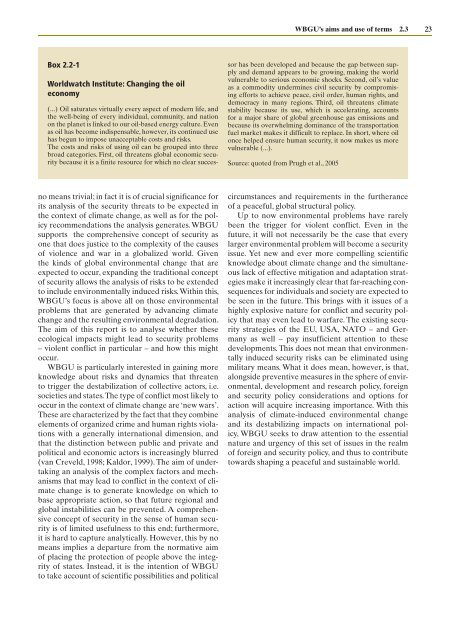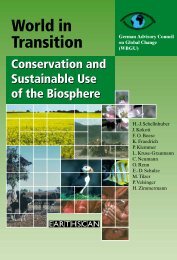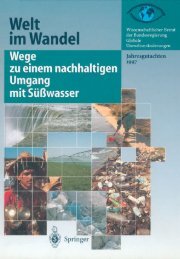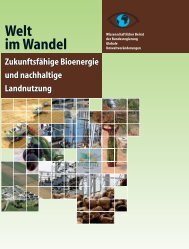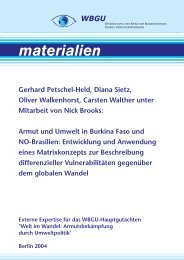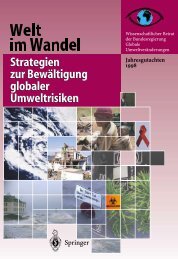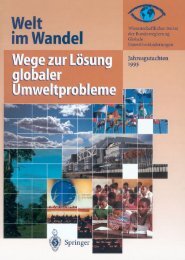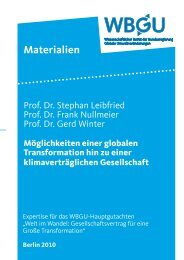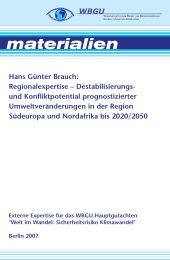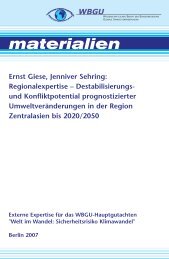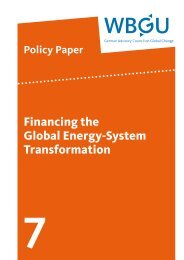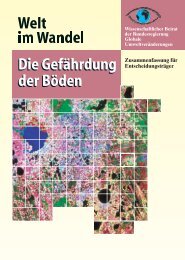World in Transition: Climate Change as a Security Risk - WBGU
World in Transition: Climate Change as a Security Risk - WBGU
World in Transition: Climate Change as a Security Risk - WBGU
You also want an ePaper? Increase the reach of your titles
YUMPU automatically turns print PDFs into web optimized ePapers that Google loves.
Box 2.2-1<br />
<strong>World</strong>watch Institute: Chang<strong>in</strong>g the oil<br />
economy<br />
(...) Oil saturates virtually every <strong>as</strong>pect of modern life, and<br />
the well-be<strong>in</strong>g of every <strong>in</strong>dividual, community, and nation<br />
on the planet is l<strong>in</strong>ked to our oil-b<strong>as</strong>ed energy culture. Even<br />
<strong>as</strong> oil h<strong>as</strong> become <strong>in</strong>dispensable, however, its cont<strong>in</strong>ued use<br />
h<strong>as</strong> begun to impose unacceptable costs and risks.<br />
The costs and risks of us<strong>in</strong>g oil can be grouped <strong>in</strong>to three<br />
broad categories. First, oil threatens global economic security<br />
because it is a f<strong>in</strong>ite resource for which no clear succes-<br />
no means trivial; <strong>in</strong> fact it is of crucial significance for<br />
its analysis of the security threats to be expected <strong>in</strong><br />
the context of climate change, <strong>as</strong> well <strong>as</strong> for the policy<br />
recommendations the analysis generates. <strong>WBGU</strong><br />
supports the comprehensive concept of security <strong>as</strong><br />
one that does justice to the complexity of the causes<br />
of violence and war <strong>in</strong> a globalized world. Given<br />
the k<strong>in</strong>ds of global environmental change that are<br />
expected to occur, expand<strong>in</strong>g the traditional concept<br />
of security allows the analysis of risks to be extended<br />
to <strong>in</strong>clude environmentally <strong>in</strong>duced risks. With<strong>in</strong> this,<br />
<strong>WBGU</strong>’s focus is above all on those environmental<br />
problems that are generated by advanc<strong>in</strong>g climate<br />
change and the result<strong>in</strong>g environmental degradation.<br />
The aim of this report is to analyse whether these<br />
ecological impacts might lead to security problems<br />
– violent conflict <strong>in</strong> particular – and how this might<br />
occur.<br />
<strong>WBGU</strong> is particularly <strong>in</strong>terested <strong>in</strong> ga<strong>in</strong><strong>in</strong>g more<br />
knowledge about risks and dynamics that threaten<br />
to trigger the destabilization of collective actors, i.e.<br />
societies and states. The type of conflict most likely to<br />
occur <strong>in</strong> the context of climate change are ‘ new wars’.<br />
These are characterized by the fact that they comb<strong>in</strong>e<br />
elements of organized crime and human rights violations<br />
with a generally <strong>in</strong>ternational dimension, and<br />
that the dist<strong>in</strong>ction between public and private and<br />
political and economic actors is <strong>in</strong>cre<strong>as</strong><strong>in</strong>gly blurred<br />
(van Creveld, 1998; Kaldor, 1999). The aim of undertak<strong>in</strong>g<br />
an analysis of the complex factors and mechanisms<br />
that may lead to conflict <strong>in</strong> the context of climate<br />
change is to generate knowledge on which to<br />
b<strong>as</strong>e appropriate action, so that future regional and<br />
global <strong>in</strong>stabilities can be prevented. A comprehensive<br />
concept of security <strong>in</strong> the sense of human security<br />
is of limited usefulness to this end; furthermore,<br />
it is hard to capture analytically. However, this by no<br />
means implies a departure from the normative aim<br />
of plac<strong>in</strong>g the protection of people above the <strong>in</strong>tegrity<br />
of states. Instead, it is the <strong>in</strong>tention of <strong>WBGU</strong><br />
to take account of scientific possibilities and political<br />
<strong>WBGU</strong>’s aims and use of terms 2.3<br />
sor h<strong>as</strong> been developed and because the gap between supply<br />
and demand appears to be grow<strong>in</strong>g, mak<strong>in</strong>g the world<br />
vulnerable to serious economic shocks. Second, oil’s value<br />
<strong>as</strong> a commodity underm<strong>in</strong>es civil security by compromis<strong>in</strong>g<br />
efforts to achieve peace, civil order, human rights, and<br />
democracy <strong>in</strong> many regions. Third, oil threatens climate<br />
stability because its use, which is accelerat<strong>in</strong>g, accounts<br />
for a major share of global greenhouse g<strong>as</strong> emissions and<br />
because its overwhelm<strong>in</strong>g dom<strong>in</strong>ance of the transportation<br />
fuel market makes it difficult to replace. In short, where oil<br />
once helped ensure human security, it now makes us more<br />
vulnerable (...).<br />
Source: quoted from Prugh et al., 2005<br />
circumstances and requirements <strong>in</strong> the furtherance<br />
of a peaceful, global structural policy.<br />
Up to now environmental problems have rarely<br />
been the trigger for violent conflict. Even <strong>in</strong> the<br />
future, it will not necessarily be the c<strong>as</strong>e that every<br />
larger environmental problem will become a security<br />
issue. Yet new and ever more compell<strong>in</strong>g scientific<br />
knowledge about climate change and the simultaneous<br />
lack of effective mitigation and adaptation strategies<br />
make it <strong>in</strong>cre<strong>as</strong><strong>in</strong>gly clear that far-reach<strong>in</strong>g consequences<br />
for <strong>in</strong>dividuals and society are expected to<br />
be seen <strong>in</strong> the future. This br<strong>in</strong>gs with it issues of a<br />
highly explosive nature for conflict and security policy<br />
that may even lead to warfare. The exist<strong>in</strong>g security<br />
strategies of the EU, USA, NATO – and Germany<br />
<strong>as</strong> well – pay <strong>in</strong>sufficient attention to these<br />
developments. This does not mean that environmentally<br />
<strong>in</strong>duced security risks can be elim<strong>in</strong>ated us<strong>in</strong>g<br />
military means. What it does mean, however, is that,<br />
alongside preventive me<strong>as</strong>ures <strong>in</strong> the sphere of environmental,<br />
development and research policy, foreign<br />
and security policy considerations and options for<br />
action will acquire <strong>in</strong>cre<strong>as</strong><strong>in</strong>g importance. With this<br />
analysis of climate-<strong>in</strong>duced environmental change<br />
and its destabiliz<strong>in</strong>g impacts on <strong>in</strong>ternational policy,<br />
<strong>WBGU</strong> seeks to draw attention to the essential<br />
nature and urgency of this set of issues <strong>in</strong> the realm<br />
of foreign and security policy, and thus to contribute<br />
towards shap<strong>in</strong>g a peaceful and susta<strong>in</strong>able world.<br />
23


